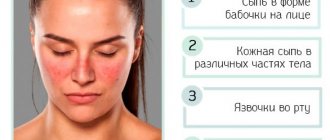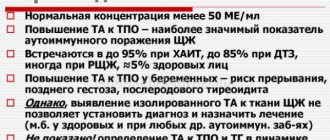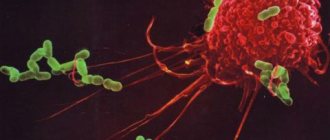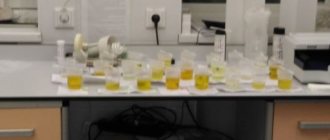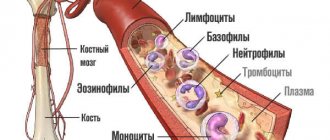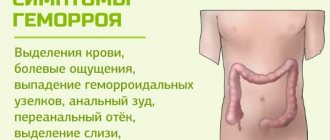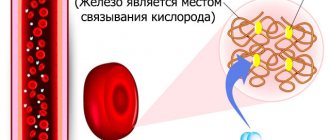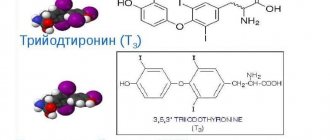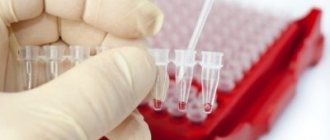Antibodies to TSH receptors (ATrTSH) are a person’s own antibodies that block or stimulate thyrotropin (TSH) receptors in thyroid cells. Thyroid-stimulating hormone is secreted by the adenohypophysis - the anterior lobes of the pituitary gland. It regulates the secretory activity of the thyroid gland, which produces the thyroid hormones thyroxine (T4) and triiodothyronine (T3). Blocking antibodies inhibit, and stimulating antibodies enhance the functions of the thyroid gland, which causes endocrine disorders.
Symptoms
In the early stages, the symptoms of all autoimmune diseases are very similar:
- You may suspect an increase in antibody activity if you constantly feel tired, pain and aching muscles, elevated temperature, rash, thinning hair, swelling, numbness in the limbs, hearing deteriorates, the skin becomes dry, and the tone of your voice changes slightly.
- With Hashimoto's thyroiditis, for example, inflammatory processes, a constant craving for sleep, and decreased performance are observed.
- With a goiter (hardening of the thyroid tissue), a person sweats a lot, is easily irritated, and has a rapid heartbeat.
Symptoms do not last forever and may appear and disappear.
Treatment
If the test results are negative and your body contains antibodies that are warring against you, do not panic and undergo additional examination. Do not rush to make any terrible diagnoses yourself.
Doctors often talk about situations where a person, without any particular reason, was recommended to take an antibody test and the antibodies turned out to be slightly elevated, which is why this unfortunate person was sent to an endocrinologist and recommended to take another half a million tests. Very often in the future such patients begin to seriously worry that something is wrong with them, although in fact everything is fine with them.
It is necessary to consult an endocrinologist, find out the TSH level, and do an ultrasound of the thyroid gland. In addition, an additional examination of the joints is carried out. After this, the doctor decides what treatment to prescribe to the patient.
Today, medicine does not have safe and working methods for reducing the amount of antibodies if it is higher than normal, however, there are ways to work with diseases caused by increased antibodies to TPO.
- The doctor may prescribe hormone replacement therapy, which includes drugs such as L-thyroxine, Eutorix.
- For heart problems, beta-blockers are prescribed. In order to monitor the effectiveness of treatment, the patient undergoes tests periodically.
- In some cases, glucocorticoids and non-steroidal anti-inflammatory drugs may be prescribed.
- In addition, vitamins and adaptogenic drugs are additionally taken.
- For severely enlarged thyroid glands, doctors recommend surgery.
If we talk about treatment with folk remedies, then in general it also has a place, although self-medication is extremely dangerous. Even if you are planning treatment with any traditional methods, it is better to discuss this with your doctor.
- Herbal mixture and persimmon tinctures are used here. You can find many recipes on the Internet.
- Also, in order to restore the functioning of the thyroid gland, you need to get a sufficient amount of iodine, maintain yourself in a good mood, take a competent approach to the treatment of viral diseases, give up alcohol and smoking if possible, eat right and normalize your daily routine as much as possible.
- Some doctors may recommend avoiding wearing jewelry around the neck, as metals can affect the functioning of the thyroid gland.
Treatment options
Most often, endocrinologists resort to traditional methods of “leveling” the hormonal levels in patients. The basis of treatment is cytostatics, their main task is to reduce the level of antibodies and neutralize them, and thereby stabilize the condition of the thyroid gland. Most often, doctors prescribe Mercazolil and Methylthiouracil. Pregnant women are prescribed Propylthiouracil. As a result of treatment with these drugs, the levels of triiodothyronine and thyroxine return to normal, and the patient’s condition gradually stabilizes.
Doctors often prescribe radioiodine therapy. This method is considered quite productive. In some cases, doctors may resort to surgical treatment. If the patient has autoimmune thyroiditis, then the basis of treatment is hormonal medications intended to stabilize the functioning of the thyroid gland (L-thyroxine, Thyroxine, Thyroidin) and drugs whose task is to improve the activity of the adrenal cortex (Prednisolone, Dexamethasone).
Rules for treatment with thyreostatics
The use of the drug should be constantly monitored by the attending physician; thyreostatics should not be taken in the initial volume (as in the first phase of treatment). This leads to cessation of thyroid function and increased production of TSH in the pituitary gland, which in turn increases the synthesis of thyrocytes. An increase in the production of thyroid cells (thyrocytes) leads to bloating, even after stopping thyroid drugs. There is a risk of developing thyroid cancer.
Carbimazole and thiamazole give a good therapeutic effect; the drugs are taken orally. Treatment with drugs begins with maximum doses that provide a therapeutic effect, then the dose is gradually reduced to the minimum. Usually carbimazole or thiamazole is taken for a year or two, once a day.
To confirm the therapeutic effect of thyreostatics, the endocrinologist will ask you to take a test for the level of T4 and T3 in the blood serum. Normal hormone levels indicate overcoming thyrotoxicosis. The TSH hormone level remains reduced for some time after the normalization of T3 and T4.
As hormonal levels normalize, physical activity is gradually restored.
Taking thyreostatics does not require the introduction of a special diet, however, the diet must contain sufficient quantities of proteins, fats, vegetables, fruits and dairy products.
Nutritionists advise eating frequently, in small portions, during treatment to prevent weakening of the body. It is recommended to include foods rich in carbohydrates (pasta, bread, fruits) in the diet; lean varieties of meat, preferably boiled, squid, seaweed and other seafood will be beneficial.
To reduce the risk of osteoporosis, you should take additional calcium supplements, and also put dairy products, fish and legumes on the table more often.
If taking hormonal medications causes weight gain, you should limit your consumption of sweets, fatty meats, sugar and foods rich in trans fats.
When hormonal metabolism is normalized, you should move more and exercise. What loads to choose and in what volume will the endocrinologist or physiotherapist recommend.
Correction of indicators
Comprehensive diagnostics allows you to determine treatment tactics
After identifying pathological antibodies and establishing a diagnosis, it is important to begin systematically taking medications to reduce their levels in the blood and normalize thyroid function. Treatment is prescribed by an endocrinologist and often includes:
- glucocorticoids,
- antithyroid drugs (Mercazolil, Methylthiouracil),
- antiarrhythmic drugs,
- sedatives.
Sometimes the prescription of a synthetic analogue of the thyroid hormone - L-Thyroxine - is indicated. In severe cases of Graves' disease, radioiodine therapy may be used in a hospital setting.
Rules for taking the analysis
If you plunge into the physiological characteristics of the human body, it becomes clear that the concentration of thyroid-stimulating hormone is not the same at different periods of the day.
TSH is maximally elevated at 4 am. The lowest value of normal indicators of this substance is typical for 7 pm. It is recommended to take blood samples to study anti-TSH levels in the morning. Before taking the test for antibodies to TSH, it is recommended to avoid eating food, smoking and drinking any liquid, with the exception of ordinary water. The last meal on the eve of the test should be taken at least 8 hours before. For laboratory research, biological material is collected from a vein. You can get the finished result the very next day.
Preparation for collecting material
For the results to be correct, you need to prepare for the test. The material for diagnosis is venous blood taken on an empty stomach. The night before, dinner should be light. In the morning you are allowed to drink only water. During the day you must stop smoking, drinking alcohol and significant physical activity.
If the patient cannot refuse to take medications 2-3 days before the test for AT to hormone receptors, it is necessary to inform the laboratory exactly what medications are being taken.
Why does TSH increase?
If TSH is elevated even slightly, this means that the thyroid gland has reduced the synthesis of iodine-containing hormones. Why this happened needs to be found out as soon as possible, before their lack disrupts metabolism throughout the body. Among the reasons why the thyroid gland has decreased its activity and the level of TSH has increased in women, men, and children are the following ailments:
- hypothyroidism – the thyroid gland has reduced the production of hormones;
- tumors of the thyroid gland or pituitary gland;
- removed gallbladder;
- heredity;
- problem with the adrenal glands;
- overdose of iodine-containing drugs;
- antibodies to the thyroid gland, TSH receptors;
- gestosis – complications during pregnancy;
- stress, insomnia;
- poor nutrition.
Having discovered the cause, treatment must be started immediately, otherwise it can provoke serious problems in the body of women, men, and children. For example, hypothyroidism, antibodies to TSH receptors and other problems in the mother's body can greatly affect the child. In an infant, the thyroid gland may be so small that it will lead to growth retardation and cause cretinism. Therefore, if a newborn child has been diagnosed with hypothyroidism, antibodies to TSH receptors and other problems associated with the functioning of the thyroid gland, treatment should be started immediately, in the first two weeks of life. Otherwise, hypothyroidism in a child will lead to irreversible consequences.
Therefore, after the cause is discovered, it is imperative to follow the treatment regimen prescribed by the doctor: on your own, without the help of medications, the thyroid gland rarely recovers, and ignoring the problem leads to death. The consequences are especially serious if the problem is caused by a tumor.
During therapy, the patient will have to undergo tests more than once. This should be done to monitor the effectiveness of treatment. This means that if therapy for hypothyroidism or another ailment is successful, deciphering the results will let the doctor know that you can stop taking the medications. Particularly good results can be achieved if hypothyroidism, antibodies to TSH receptors and other ailments were detected at a stage when the level of thyrotropin has risen, but the concentration of other hormones has not yet changed.
In some cases, lifelong therapy is prescribed. In this situation, the analysis should be done regularly, at the same time, and TSH values should range from 0.3 to 3 µIU/ml. Such monitoring will allow the doctor to timely adjust the treatment regimen if indicators change.
Analysis transcript
After performing a laboratory blood test for antibodies to specific TSH receptors, the norm is interpreted as follows:
A result of less than 1.5 m/l means a negative result;
From 1.5 to 1.76 m/l - questionable results;
More than 1.76 m/l - the analysis is considered positive.
If a negative test result is obtained, we can say that the person does not have functional and organic disorders in the thyroid gland. In some situations, even a negative result is not a guarantee of complete well-being. If there is any doubt, a medical specialist recommends additional examination methods.
When is an antibody test prescribed?
If there is a suspicion that the patient's TSH is elevated or decreased, the doctor will prescribe a test for antibodies to TSH receptors. Research is necessary in the following cases:
- Pregnant women in the last 3 months of gestation are prescribed a test for antibodies to TSH receptors if the woman has previously suffered from thyroid disease. The study will help the doctor determine the likelihood of thyroid disease in the baby.
- In the treatment of Graves' disease. It is characterized by an increase in the volume of the thyroid gland due to an excess of the amount of hormones it produces. The analysis allows us to conclude how effective the treatment is.
- Pregnant women have their blood taken for analysis if there are signs of insufficient thyroid activity.
- The test is prescribed to newborn infants when antibodies to the TSH receptor are detected in their mother.
- For thyrotoxicosis (excessive production of thyroid hormones), the analysis helps to develop treatment tactics. In this case, additional diagnostics are necessary to identify the causes of the disease.
The specialist will recommend taking an ATTG test if the patient complains of causeless irritability, anxiety, insomnia, if the patient has experienced a sudden change in body weight, or if cardiovascular diseases are present.
increased antibodies to TSH
Found (85 posts)
endocrinologist September 6, 2013 / Anastasia... / Moscow
...were diagnosed with primary hypothyroidism as a result of AIT. TSH
- 3.65 (norm up to 4.0), T4 St - ... .3 (norm from 9 to 18).
Antibodies
also elevated - 255 (normal is up to 5).
... please, is it really necessary to lower TSH
to less than 2, because it doesn’t work for me ... open
endocrinologist August 11, 2013 / Natalya / Engels
Good afternoon ! In February I was diagnosed with signs of diffuse nodular formations of the thyroid gland. right lobe - width 2.0 thickness 1.6 length - 4.5 left lobe 2 x 1.8 x 4.7 V glands - 15.2. In the right lobe... open
August 13, 2013 / Anonymous
It may be a secret to your doctor, but these antibodies
no need to check or reduce.
It is enough that TSH
.
These antibodies are elevated
in 10% of healthy people. Eutirox is not used to treat nodes. Benign according to...
endocrinologist May 25, 2013 / Alexander... / Alatyr
Hello, I have been treating diarrhea for 5 years; I gave birth to a child 1.5 years ago and took propicil. I didn’t take anything for 4 months, then the doctor prescribed 1 tablet. I passed Mercazolil on the day... open
June 1, 2013 / Alexander
...the method of choice will be surgery. However, according to your two indicators ( TSH
, T4 sv) it is not clear in absentia whether there is now a relapse of DTZ.
You can donate
thyroid-stimulating hormone receptor
antibodies Now, if they are elevated
, this is an indication for...
endocrinologist May 9, 2013 / Alexandra... / Vladivostok
MRI: Endosellar location of the pituitary gland. The pituitary gland is enlarged, measuring 11x7.9x8.8. Asymmetry of the upper contour of the pituitary gland tissue. This is fine? open
May 10, 2013 / Anonymous
TSH increased several times
antibodies
were previously
elevated , but prolactin is slightly elevated. I feel terrible, and my vision has dropped significantly over the past year. By the way, an MRI in December showed that everything...
endocrinologist March 6, 2013 / Inna
... (I have had this since childhood). Took hormone tests: TSH
-thyroid-stimulating hormone and free T4 are normal - 1.13 and 1, ... from 0 to 40. I am 23 years old.
Antibodies
to peroxidase are also
elevated
- 97. Ultrasound doctor's conclusion - diffuse changes in the thyroid gland. Knot? Plot … open
endocrinologist March 5, 2013 / Olga / Samara
..., took tests because the TSH
decreased, free T3 and T4 are normal.
... 16.44 (normal 9.01-19.05) Antibodies
to thyroglobulin 21.1 ABOVE NORMAL (norm less than ... 13 weeks of pregnancy? Why can
antibodies
elevated , why is this dangerous for ... open
endocrinologist February 18, 2013 / Tatyana / 0
… thyroid. I got tested.
Antibodies
to thyroglobulin (4435 IU/ml) and thyroid peroxidase (1610 IU/ml)
are highly elevated hormones TSH
, T3 and T4 are normal, thyroglobulin is reduced (less than 0.2 mg/ml). Some… open
endocrinologist October 16, 2012 / Natalya / Moscow
My husband has monocular diplopia of unknown etiology. Ultrasound shows enlargement of the extraocular muscles. MRI of the brain, Ultrasound of the thyroid gland - normal, thyroid hormones - normal, general neurology -... open
October 16, 2012 / Alexander
Hello. If we are talking about endocrine ophthalmopathy, then it will cause increased
antibodies
to the
TSH
. Unfortunately, I cannot make a diagnosis in absentia. There are quite clear recommendations for diagnosis and treatment...
endocrinologist October 15, 2012 / Tatyana / Moscow
... I was diagnosed with stage I-II DTZ. The gland is not enlarged, there are no nodes. T3 and T4 were elevated
,
TSH
was not detected,
antibodies
were 2.3 when the norm was 1. Pulse up to 120, pressure reached 170/110. They prescribed Mercazolil with 20 mg, ... open
endocrinologist August 18, 2012 / Sveta / Kyiv
Hello, Doctor. My baby is almost 3 months old. (born May 24, 2012). On January 1, 2011, she began treating DTZ by taking Tyrozol. After 8 months got pregnant (not planned). At the 6th week. pregnancy... open (6 more messages)Last 5:
August 20, 2012 / Alexander
... when the hormones return to normal and you will need to decide whether to stop treatment or not. Antibodies
TSH
receptors return to normal more slowly than hormones.
...whether there will be a relapse of the disease or not. While they are elevated
, you cannot stop treatment, otherwise there is a risk of relapse...
Reasons for increasing values
As mentioned earlier, an increased level of antibodies to TPO means a militant attitude of the immune system towards the body’s cells. The main reason for this is a “breakdown” of the thyroid gland, due to which thyroid peroxidase enters the bloodstream.
TPO is necessary for the body, because it plays a significant role in the synthesis of iodine. If the amount of antibodies against TPO increases, less iodine is synthesized because the level of TPO decreases. Iodine is required by the body to produce the hormones T3 and T4, which, accordingly, are now also poorly produced. Problems begin with the functioning of the gastrointestinal tract, heart, blood vessels, nervous and respiratory systems.
The causes of elevated markers of autoimmune diseases are:
- diseases such as diabetes, thyroiditis, hereditary immunity disorders, rheumatism, thyroid injuries;
- various viral diseases, inflammation, iodine deficiency or excess.
In addition, the amount of antibodies is affected by:
- ecology;
- stress;
- viral diseases;
- long-term treatment with hormonal drugs.
Antibodies may be slightly elevated if the patient had radiation therapy before donating blood.
With a normal TSH level, increased AT to TPO relative to the norm is not yet a pathology.
Antibodies and receptors
Receptors are associations of nerve endings, neurons and formations of intercellular substance. They ensure the transformation of internal or external environmental factors into nerve impulses. TSH receptors respond to T3 and T4 and promote their production.
Antibodies are proteins that combine with certain types of molecules (immunoglobulins or globulins). This is how the immune system reacts. If any malfunction occurs in the immune system, then it produces antibodies to the hormone, which stop its action and begin to stimulate the thyroid gland.
As a result, the level of two hormones increases significantly, which provokes the development of hyperthyroidism. When the opposite condition occurs, thyroid hormones are poorly produced or quickly destroyed, hypothyroidism occurs.
But it is almost impossible to find out which TSH ATr are synthesized by analysis; the test only helps to see the ratio of antibodies to thyrotropin receptors.
Article on the topic: TSH hormone (thyroid-stimulating): the norm for women of different ages
AT to TG
The following can increase the level of these substances:
- autoimmune thyroiditis;
- diffuse toxic goiter;
- treatment of papillary and follicular thyroid cancer.
This indicator is of particular importance in the diagnosis of cancer. In papillary and follicular cancer, the resulting tumors begin to produce thyroglobulin in large quantities. After surgery to remove the thyroid gland, its level decreases sharply (equal to zero). If after removal of tumors this indicator is high, we can talk about relapse of oncology.
In some patients, antibodies to TG bind to thyroglobulin molecules and significantly change their shape and structure. As a result, they become invisible to laboratory analyzers. Therefore, determination of the level of these substances should be carried out together with an analysis for thyroglobulin. It should also be remembered that this type of diagnosis of cancer is only permissible for patients who do not have a thyroid gland. In a healthy person, the level of AT to TG should not exceed 40 IU/ml.
Normalization of anti-TSH antibody levels
What to do if a patient is diagnosed with hyperthyroidism, Graves' disease or thyroid disease? Typically, therapeutic therapy is carried out using special drugs. They are prescribed on an individual basis, taking into account the detected level of antibodies.
These may be cytostatics “Mercazolil” or “Methylthiouracil”. These drugs suppress antibodies that act on the thyroid gland, and TSH increases as a result.
In addition, in order to ensure the hormone has an unimpeded effect on the thyroid gland, the patient is prescribed radioiodine therapy.
A very high level of antibodies may be an indicator for surgery. During this procedure, part of the thyroid gland is removed. The one in which the tumor appeared. And although a person after this operation will be forced to take a number of medications for the rest of his life, his overall quality will not be affected.
Antibodies to TSH receptors
Antibodies to TSH receptors (AT-rTSH) are such would-be protectors. These are immunoglobulins of class G. For them, the target organ is the receptors that attach the TSH molecule to the surface of the thyrocyte.
Regulation of the production of thyroid hormones is carried out precisely through this receptor. The receptor that attaches TSH helps the latter penetrate inside the cell and stop the production of excess hormones.
AT-rTSH attach to these receptors and prevent TSH from acting on thyrocytes. Since there is no restriction on their activity, thyrocytes begin to produce thyroid hormones in large quantities. The TSH level becomes lower and lower, but the activity of the thyroid gland does not decrease.
Why determine the level of antibodies to TSH receptors?
- Diagnostics – it is the determination of the AT-rTSH level that is necessary to make a diagnosis. If the indicator is higher than normal, the diagnosis of diffuse toxic goiter is beyond doubt.
- Determination of treatment tactics - treatment of thyroid cancer begins with the use of antithyroid drugs that block the function of the thyroid gland. AT-rTSH decrease - treatment with these drugs continues.
- Prognosis and probability of relapse - if after a certain period of treatment a state of euthyroidism is achieved, but the level of AT-rTSH remains as high as before treatment, the probability of relapse of DTG is very high. In this case, surgical treatment is recommended.
AT-rTSH and pregnancy
Determination of this indicator during pregnancy is indicated when a low TSH level is detected, which may be a variant of the norm. If the indicator is not increased, there should be no worries. Pregnancy is proceeding normally.
Thyroid-stimulating hormone receptors are membrane structures of thyrocytes. They specifically bind pituitary TSH and ensure the implementation of its biological action. An increase in the level of Antibodies to the TSH receptor (AT to rTSH) is observed in Graves' disease (diffuse toxic goiter).
A test to determine antibodies to TSH receptors is an important step in the diagnosis of Graves' disease - diffuse toxic goiter (autoimmune hyperthyroidism).
Indications for determining Anti-TSH p antibodies:
- Identification or exclusion of autoimmune hyperthyroidism and its differential diagnosis with autonomous ectopia of the thyroid gland. The detection of Anti-TSH p antibodies in patients with thyrotoxicosis indicates that the disease is of an autoimmune nature. Since the course of treatment for Graves' disease differs from that of other forms of hyperthyroidism, it is clear that before starting treatment for a patient with thyrotoxicosis, it is necessary to test for antibodies to the TSH receptor.
- Monitoring therapy for Graves' disease and assessing the likelihood of relapse in patients. The amount of Anti-TSH p antibodies decreases with successful therapy. A significant drop in titer or disappearance of these antibodies means the patient is in remission of the disease, and based on this fact, the end of the course of therapy can be planned.
- Determination of Anti-TSH p antibodies should be carried out in pregnant women in the third trimester of pregnancy. Since these antibodies belong to the class of IgG antibodies, they can cross the placenta and lead to thyroid disease in infants. In patients with a history of thyroid disease, testing for antibodies to TSH receptors in the third trimester of pregnancy is mandatory. This will allow us to identify and assess the risk of developing thyroid pathology and the fetus.
When is it necessary and how to reduce it correctly?
Treatment is prescribed when there is a large amount of ATrTSH in the blood - more than 1.8 IU/l. In 95% of cases, conservative therapy is sufficient. It is carried out in several directions:
- Antithyroid drugs. To reduce the concentration of thyroid hormones, use Methylthiouracil, Mercazolil. During pregnancy, a medicine with fewer side effects is used - Propylthiouracil.
- Radioiodine therapy. To shrink the thyroid gland and reduce its secretory activity, take medications with radioactive iodine. They destroy some thyrocytes. Due to this, the concentration of T3 and T4 decreases to normal values, and the symptoms of hyperthyroidism disappear.
- Protein diet. Stimulating antibodies to TSH receptors accelerate metabolism, which is why patients rapidly lose weight. To replenish energy reserves, the diet should consist of 55% animal protein. Hot sauces and seasonings are excluded from the menu.
During treatment, patients should strictly monitor the concentration of T3 and T4, antibodies to TSH receptors in the blood. A decrease in their level indicates the effectiveness of therapy.
Pathologies of the thyroid gland in pregnant women
In women, during pregnancy, AT can penetrate the placenta, subsequently causing congenital pathologies of the thyroid gland in children. Patients registered with an endocrinologist should undergo an AT test during pregnancy to eliminate the risk of problems with the thyroid gland in the newborn.
An antibody test in a pregnant woman helps identify the following diseases:
- Graves' disease;
- thyrotoxicosis;
- diffuse toxic goiter.
Uncompensated thyrotoxicosis, caused by the production of antibodies to TSH, leads to the following deviations from the norm in a woman’s physical well-being:
- placental abruption;
- miscarriage;
- arterial hypertension;
- anemia;
- thyrotoxic crisis;
- heart failure
Congenital thyrotoxicosis leads to:
- intrauterine developmental delay;
- improper structure of internal organs;
- physical disabilities.
Deviation from the norm in the results of an AT test is not a reason to perform an artificial termination of pregnancy. Thyrotoxicosis requires compensatory therapy with hormonal drugs. To relieve symptoms of thyrotoxicosis and normalize the physical condition of pregnant women, propylthiouracil is used, a drug that does not pass into breast milk and the blood of newborns. If problems are identified during pregnancy that require radical intervention, surgery or radioactive iodine, their solution is postponed to the postpartum period.
The initial dose is 200 mg/day, it allows you to maintain normal T4. The level of T4 hormone production should be monitored every month.
During pregnancy, hormone levels gradually normalize and propylthiouracil is usually discontinued in the third trimester.
A few months after giving birth, the symptoms of thyrotoxicosis may return; it is necessary to donate blood again for hormones and, if necessary, start taking thyreostatics. Taking small doses of the drug by the mother is safe for breastfed children, however, if high doses are prescribed, it is recommended to stop feeding.
Anti-rTSH is elevated: what to do
It also happens that antibodies to thyrotropin receptors significantly exceed the permissible values. What could this be connected with, and what should I do next?
Possible reasons for deviation from the norm
Important! The main difference between AT-rTSH and other antibodies is stimulation rather than suppression of the functional activity of the thyroid gland.
The main reason (in 85% of cases) for the increased concentration of antibodies to TSH receptors in the blood is diffuse toxic goiter.
This pathology is characterized by an increase in the size of the thyroid gland and excessive production of thyroid hormones - hyperthyroidism:
- sudden weight loss with increased appetite;
- acceleration of metabolism, tendency to diarrhea;
- increased heat production: low-grade body temperature (37.0-37.6 °C), poor tolerance to heat, stuffiness;
- disorders of the cardiovascular system: tachycardia, arrhythmias;
- increased irritability, nervousness, anxiety, sleep problems;
- ocular symptoms (exophthalmos, incomplete closure of the palpebral fissure when blinking, setting sun symptom, etc.).
An enlarged thyroid gland may be accompanied by a feeling of constriction or a lump in the throat
Less common causes of elevated anti-rTSH include:
- Hashimoto's disease;
- subacute thyroiditis;
- other forms of inflammation of the thyroid gland.
What does this hormone mean?
Everyone knows why a person needs immunity. It protects the body from harmful viruses and bacteria that can harm health. Defenders are various antibodies, which consist of proteins that can detect the “villain”.
But this mechanism does not always work smoothly and correctly; a failure, already described above, may occur - antibodies will begin to fight with healthy cells of the body.
The abbreviation AT to TPO stands for Antibodies to Thyroid Peroxidase.
Thyroid peroxidase is an organic substance consisting mainly of protein produced by the thyroid gland, which is involved in the hormonal synthesis of organic compounds.
For various reasons, the immune system may consider this enzyme an enemy and try to get rid of it. Because of this, AT to TPO increases, as a result of which the synthesis of many important hormones is disrupted.
Normal indicators
In order for a doctor to correctly assess the condition of the thyroid gland, the patient must undergo a test, the material for which is taken from venous blood.
There are international standards that are used to make things easier to understand. For all people, the norm of AT to TPO depends on age.
In adult women and men, it looks on average like this:
- up to 50 years – not higher than 30 IU/ml;
- after 50 years – not higher than 50 IU/ml.
During pregnancy, the norm of antibodies to TPO should be 5.6 units/ml.
It is worth noting that an increase of twenty units is still the norm, but this should still be monitored in order to prevent problems.
In a child, depending on age, the number of antibodies changes:
- in newborns – 1.1 – 17.0 mIU/l;
- up to two and a half months – 0.6 – 10.0;
- up to two years – 0.4 – 7.0;
- up to five years – 0.4 – 6.0;
- up to fourteen – 0.4 – 5.0.
Normal TSH content in tests
There is a standard for average indicators that experts rely on when determining antibodies to the TSH hormone. The normal level of TSH in the blood is the same in women and men:
- less than 1.8 IU/l – a negative result, this is the same norm discussed above;
- from 1.8 IU/l to 2.0 IU/l – average value (borderline): antibodies to thyroid-stimulating hormone receptors are increased, but this value is within the acceptable limit and, most likely, the patient will be examined additionally;
- more than 2.0 IU/l, antibodies to thyroid-stimulating hormone receptors are increased, the doctor may need dynamic monitoring.
- over 10.0 IU/l and 40 IU/l – is considered a very unfavorable prognosis, the disease progresses.
It happens that the analysis gives false results. It is necessary to responsibly prepare for the test.
Characteristics of the hormone
Thyrotropin (other names: TSH or thyroid-stimulating hormone) is a hormone produced by the pituitary gland to regulate the functioning of the thyroid gland. It has an effect on iodine-containing thyroid hormones, thyroxine and triiodothyronine, acting on thyroid receptors, stimulating or reducing their production. Thyrotropin is produced by the pituitary gland, an endocrine gland located in the sella turcica - a bone pocket in the wedge-shaped part of the skull, and attached below to the brain.
The activity of the pituitary gland is controlled by the hypothalamus, one of the parts of the brain. As soon as it detects an increase or decrease in the synthesis of thyroid hormones, it sends a signal to the pituitary gland, which, in order to reduce the production of thyroid hormones, increases the synthesis of TSH, in order to increase it, it decreases.
In order for the body to function correctly, without failures, thyrotropin and iodine-containing hormones must interact well with each other. Together they influence the metabolism of fats, proteins and carbohydrates in the body, regulate the cardiovascular, reproductive, digestive and nervous systems of humans. Therefore, their quantity in the blood is completely interrelated.
The norm of antibodies for pregnant women
During pregnancy, it is necessary to monitor the volume of antibodies to rTSH in the mother’s body, making sure that the antibodies do not penetrate the baby’s body, breaking the placental valve. They can have a negative impact on the baby's growth and development.
In the last 4.5 months of pregnancy, the baby’s own thyroid gland begins to work in the womb, and you need to ensure that he does not develop hyperthyroidism (increased functioning of the thyroid gland and excessive production of hormones).
The normal range of antibodies to TSH in pregnant women is considered to be from 0.2 IU/L to 3.6 IU/L. A higher score indicates the need for treatment.
At the same time, you need to understand that anti-TSH and just TSH are different indicators. Thyrotropin may be elevated because the infant's development requires an increase in all of the mother's resources. It is often suggested to do another test for antibodies to thyroid peroxidase. These ATs can reduce the production of the main thyroid hormones - thyroxine and triiodothyronine.
Pregnant women are prescribed Propylthiouracil as a cytostatic. The dosage of the medicine and the frequency of its administration is determined by the doctor. It is more dangerous for pregnant women than for anyone else to treat themselves.
What to do if your AT level increases
How can you lower the level of antibodies that are produced to thyroid cells? In some cases, this is not necessary, since a minor deviation is not considered a pathology. A reduced rate is also considered a variant of the norm.
If the analysis reveals very high values, which are combined with symptoms of thyrotoxicosis or hypothyroidism (enlarged thyroid gland, fatigue, excessive sweating, etc.), the following treatment is carried out:
- use of thyroid drugs. They replenish the deficiency of thyroid hormones;
- glucocorticoid therapy;
- removal of the thyroid gland;
- use of selenium preparations.
If the functioning of the thyroid gland is maintained, the prognosis for patients is favorable. If treatment is not applied, severe heart failure occurs, atherosclerosis and dementia develop.
Bibliography
- Rudnitsky, Leonid Diseases of the thyroid gland. Pocket guide / Leonid Rudnitsky. - M.: Peter, 2020. - 256 p.
- Sinelnikova, A. 225 recipes for thyroid health / A. Sinelnikova. - M.: Vector, 2013. - 128 p.
- Sinelnikova, A. A. 225 recipes for thyroid health: monograph. / A.A. Sinelnikova. - M.: Vector, 2012. - 128 p.
- Uzhegov, G.N. Thyroid diseases: Types of diseases; Treatment with traditional medicine; Medical / G.N. Uzhegov. - Moscow: Russian State University for the Humanities, 2014. - 144 p.
- Khavin, I.B. Diseases of the thyroid gland / I.B. Khavin, O.V. Nikolaev. - M.: State Publishing House of Medical Literature, 2007. - 252 p.
What does a negative result indicate?
If the analysis reveals zero or low levels of antibodies, it means that there are currently no thyroid pathologies in the body, but it is too early to relax. It is quite possible that this indicator indicates that the disease is currently in remission after treatment. In this case, it is better to play it safe and take the biomaterials again after some time.
Low antibody levels may also indicate that the blood was drawn incorrectly or that the patient did not comply with all requirements in preparation for the test.
increased antibodies to TSH
Found (85 posts)
endocrinologist February 11, 2020 / Ksenia / Moscow
… . I take oral contraceptives Regulon, because your menstruation cycle is irregular. My
antibodies
to TPO
elevated TSH
= 9. I was prescribed l-thyroxine 100 mcg.
I drank for 5 months. now I have ttg
= 0.01. T3 is slightly above normal, T4 is ok... open
endocrinologist January 10, 2020 / Semenova…
...
antibodies
increased , and in this analysis they are normal, but
antibodies to TPO
were increased TSH
was ... 198/110.
Now I have received the result: TSH
has become even lower - 0.012 (already... remains? For what reason can
TSH
continue to decrease after stopping eutyrox?... open
endocrinologist November 28, 2014 / Irina / Kursk
... Diagnosed with AIT, tested TSH
0.51 t4 16.6
antibodies
to TPO 322
are increased
, female hormones are normal, male testosterone and free.
... changes occur with hyperprolactinia and is it necessary to reduce the hormone antibodies
to TPO? Doctors tell me I don’t need it ... open
endocrinologist November 16, 2014 / Irina / Chelyabinsk
... makes a diagnosis: nodular non-toxic goiter, grade 0-1, against the background of AIT. All tests are normal: TSH
, T4 St., T3 St.
Only antibodies
are elevated - last time it was 220. I get examined every year. No treatment ever...open
endocrinologist November 6, 2014 / Tatyana
Good afternoon.. Please tell me whether antibodies
for pregnancy they
are elevated
as much as 735.
TSH
, TTs are normal. I recently had an hCG test and my hCG began to drop. Perhaps this is due to increased antibodies...? Which one can... open
endocrinologist August 23, 2014 / Natasha / Omsk
Hello, doctor! This is the situation: increased
antibodies
to TPO-68.81; T4-16.15;
TSH
-1.95; Of the sex hormones, FSH-18.11 is elevated... these test results, I’m very worried that
antibodies
elevated , I read that this can... open
endocrinologist May 24, 2014 / Ksenia / Novosibirsk
... scheme, up to 15 mg for a long period. During analysis: ttg
=0.004 mU/l and t4 sv =28.3 pmol/l.
Antibodies
to the
TSH
were also
elevated
.
In the month of May, tests showed: ttg
= 19.8 and t4 st = 8.9. I also found out about pregnancy, 1-2 weeks. Tell me... open
endocrinologist April 10, 2014 / Irina / Moscow
... in February 2014 there was a curettage of 69ХХХ triploidy. I am undergoing examination of thyroid hormones T3, T4, TSH
normal, slightly
elevated
ATTPO antibodies I took female hormones on the 5th day of the cycle, on an empty stomach. The result is all hormones... open
endocrinologist December 25, 2013 / Anna / Saratov
Hello, I’m planning a pregnancy, a gynecologist-endocrinologist prescribed a blood test for TSH and AT for TPO, and said that if the tests are normal, I should take iodomarin... open
December 30, 2013 / Alexander
Iodomarin will not harm you even with elevated antibodies and is needed regardless of TSH
.
TSH
, by the way, is needed below 3.0.
There is simply a greater chance that levothyroxine will be needed during pregnancy if antibodies are elevated
.
endocrinologist December 3, 2013 / Elena / St. Petersburg
...hormones, analysis showed that TSH
increased, T4 decreased and
antibodies
also
increased
.
I went to an endocrinologist, she... (a couple of years later) decided to get tested again: TSH
– 26, T4 slightly lowered,
antibodies
very
elevated
. I went to the medical center to see an endocrinologist, they did ... open
Reasons for increased Ab to TSH receptors during pregnancy, what should be done
TSH is an abbreviation that stands for thyroid-stimulating hormone. This is a biologically active substance synthesized in the anterior lobe of the pituitary gland. The activity of its production directly depends on the level of hormones produced by the thyroid gland - thyroxine and triiodothyronine. The higher their content in peripheral blood, the lower the TSH value and vice versa.
During immune failures, the body synthesizes specific antibodies to thyroid-stimulating hormone, which affect its own tissues. Women are more prone to developing autoimmune diseases. And the pregnancy period requires especially careful monitoring. How to identify a deviation and what to do will be discussed further.
What is it - TSH?
The abbreviation TSH stands for thyroid-stimulating hormone or, as it is also called, thyrotropin. The production of this substance is carried out by the pituitary gland, an endocrine gland located on the lower surface of the brain. The pituitary gland is responsible for metabolism, body growth and reproductive function. To regulate the activity of all other endocrine glands, hormones secreted by the pituitary gland are very important.
Among other hormones, the pituitary gland secretes the hormone TSH. This hormone regulates the functioning of the endocrine system, affecting the thyroid gland. Thyroid-stimulating hormone, also called the TSH hormone, enters the blood, reaches the thyroid gland and causes it to secrete thyroid hormones.
What are thyroid hormones?
The thyroid gland produces two thyroid hormones: thyroxine (T4) and triiodothyronine (T3). The difference is one additional iodine atom in the molecule. The activity of triiodothyronine (T3) is several times higher than that of thyroxine (T4). An essential component of these hormones is iodine. The importance of these hormones is difficult to overestimate. Thyroid hormones perform many functions and are responsible for:
- development and growth of the body;
- cardiac and respiratory functions;
- digestive and nervous systems.
Their deficiency or excess provoke disruptions in the body. These failures are a litmus test showing that not everything is in order with the endocrine system. During a complete endocrine examination, it is often suggested to take a test for antibodies to TSH. Exceeding the permissible level of antibodies to TSH means problems in the functioning of the thyroid gland.
What are antibodies and receptors (designation)
Receptors are nerve formations that convert an internal or external factor (the so-called stimulus) into a nerve impulse. For TSH, such an irritant is the hormone T3 and T4. The more TSH is produced, the more the thyroid gland produces the hormones T3 and T4. These thyroid hormones enter the blood, the signal about their quantity reaches the TSH receptors, and if their level is insufficient, the TSH hormone is increased.
The immune system may malfunction and develop antibodies to TSH receptors. Then the body, roughly speaking, will begin to mistake TSH hormones for foreign ones and fight them. Antibodies are proteins that bind to cells. Antibodies are of three types - the hormone thyrotropin, stimulating or inhibiting. The analysis will not show which antibodies have been developed, but the specialist will determine them based on the general clinical picture. Therefore, the patient or laboratory technician should under no circumstances try to understand the result. Decoding is a matter for a specialist.
